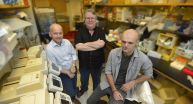(Press-News.org) AUGUSTA, Ga. – A fundamental theory about how our thymus educates our immune police appears to be wrong, scientists say.
It's known that stem cells come out of the bone marrow and travel to the tiny thymus gland behind the breastbone to learn to become one of two CD4T cell types: one leads an attack, the other keeps the peace.
One widely held concept of why they become one or the other is that, despite coming from the same neighborhood and going to the same school, they are exposed to different things in the thymus, said Dr. Leszek Ignatowicz, immunologist at the Medical College of Georgia at Georgia Regents University.
In this case, the "things" are ligands and developing T cells are potentially exposed to thousands of these tiny pieces of us inside the thymus. "Ligands are like our fingerprints," said MCG Postdoctoral Fellow Dr. Lucasz Wojciech.
But when MCG scientists limited exposure to only one fingerprint, the same mix of T cells still emerged, said Ignatowicz, a corresponding author of the study in the journal Nature Communications. "We asked a simple question: Is it going to affect their development and the answer was no," Ignatowicz said. "The cells still mature in the thymus, so something else must be determining it."
The finding provides more insight into immunity that could one day enable a new approach to vaccines that steer the thymus to produce more of whatever T cell type a patient needs: more effector cells if they have a bad infection or cancer, more regulatory T cells if they are experiencing autoimmune diseases like arthritis and multiple sclerosis. "We could help steer the education process in the desired direction," Ignatowicz said.
It's definitely a tough learning experience in the thymus. The vast majority of T cells learn to be too aggressive or too passive so never make it out of the thymus. About 90-95 percent of T cells that survive become effector cells, which will one day drive the response of the immune system to invaders such as bacteria, viruses, and tumors. Effector cells will learn to recognize and attack invaders once they are out roaming the body. Still these future aggressors are the ones that bind less strongly to ligands they experience in the thymus. "You wouldn't want an effector cell that bind strongly to yourself because you would attack yourself," explained Dr. Richard A. McIndoe, a bioinformatics expert and Associate Director of the MCG Center of Biotechnology and Genomic Medicine.
T cells that bind most strongly are the small, but essential percentage of regulatory T cells, or Tregs, which down-regulate the immune response and, ideally, prevent self-attack. It's a pretty powerful minority: Mice missing Tregs die within three weeks of birth; without a bone marrow transplant, humans will die as well as the body attacks major organs, Ignatowicz said.
In this study, the scientists had two mice, each expressing a single ligand in the thymus, one the researchers thought would prompt strong binding, so favor Treg development, and another that would favor a weaker bond and effector cell development.
While the mix of resulting T cells was the same as if both were exposed to the usual thousands of ligands, there was a difference. Ligands – and eventually bacteria and other invaders – get the attention of T cells by activating their receptors. Both CD4T cell types generally have the same receptors, just organized differently.
MCG scientists found as long as the binding was weak, as it was in the first mouse, there was a lot of overlap in the receptors the ligand bound to in both T cell types. However, in the second mouse, which should have favored Treg development because the ligand prompted strong binding, there was far less overlap. "We are now trying to find what causes that difference," Ignatowicz said.
INFORMATION:
Wojciech is first author and McIndoe a co-author of the new study, which was funded by the National Institutes of Health.
Toni Baker
Communications Director
Medical College of Georgia
Georgia Regents University
706-721-4421 Office
706-825-6473 Cell
tbaker@gru.edu
Scientists question fundamental theory about education of immune police
2014-10-08
ELSE PRESS RELEASES FROM THIS DATE:
Timely Ebola information from Journal of Disaster Medicine & Public Health Preparedness
2014-10-08
Rockville, MD – The Society for Disaster Medicine and Public Health is committed to examining the details of individual disasters and public health crises. With the recent arrival of Ebola in the United States, the journal is launching a special issue on the virus. The journal will serve as an educated and authoritative voice on the virus, risk and threat level, potential of outbreak, preparation and response for the public and media.
The Journal of Disaster Medicine and Public Health Preparedness, began covering events in their entirety via special issues this ...
Robotic surgery: More complications, higher expense for some conditions
2014-10-08
NEW YORK, NY (October 8, 2014)—For benign gynecologic conditions, robot-assisted surgery involves more complications during surgery and may be significantly more expensive than conventional laparoscopic surgery, according to a study by researchers at Columbia University Medical Center (CUMC). The results were published online today in Obstetrics & Gynecology.
Robot-assisted surgery was first widely used for radical prostatectomy. For procedures such as prostatectomy, where there were previously no minimally invasive options, robot-assisted laparoscopy often offered ...
Trying to fool a kindergartner? Not so fast
2014-10-08
This news release is available in French. Montreal & Vancouver, October 8, 2014 — From the words for colours to how to tie a shoelace, kids have lots to learn — and for the most part, they depend on others to teach it to them.
But whether deliberately or inadvertently, other people sometimes misinform. So at what age can kids tell trustworthy teachers from confident tricksters?
A new study published in PLOS ONE by psychology researchers from Concordia University and the University of British Columbia shows that by the age of five, children become wary ...
Managers can boost creativity by 'empowering leadership' and earning employees' trust
2014-10-08
HOUSTON – (Oct. 8, 2014) – Managers can promote creativity in employees by "empowering leadership" and earning employees' trust, according to a new study by Rice University and American University.
The researchers investigated, for the first time, the complex effect of the interaction among empowering leadership, uncertainty avoidance and trust on creativity. They collected supervisors' ratings of employee creativity in two separate studies in China: one with employees of an energy-saving light bulb design and manufacturing company and the other with the employees ...
Gay and bisexual youth can thrive with positive family relationships
2014-10-08
Gay and bisexual youth who are supported by their family and feel comfortable talking to them about their lifestyle are less likely to become involved in high-risk sexual behaviors, according to a recent Rutgers study.
Published in the Journal of Marital & Family Therapy, the Rutgers School of Social Work study, Condoms and connection: Parents, gay and lesbian youth and HIV risk, found that positive family relationships and open dialogue led to an increase in safe sex practices, including the use of condoms, while disrupted family relationships resulted in risky sexual ...
Drug regimen enough to control immune disease after some bone marrow transplants
2014-10-08
Johns Hopkins and other cancer researchers report that a very short course of a chemotherapy drug, called cyclophosphamide, not only can prevent a life-threatening immune response in some bone marrow transplant recipients, but also can eliminate such patients' need for the usual six months of immune suppression medicines commonly prescribed to prevent severe forms of this immune response. Patients receive cyclophosphamide for two days after their bone marrow transplant, in addition to two other chemotherapy drugs given before the transplant.
Johns Hopkins Kimmel Cancer ...
Slime-producing molecules help spread disease from cats to sea otters
2014-10-08
The spread of diseases from land animals to sea otters and other marine mammals is aided and abetted by gelatinous, sticky polymers produced by seaweed, reports a research team headed by a UC Davis veterinary infectious-disease expert.
These large, complex molecules form slimy biofilms and bind water-borne organic matter into larger particles, in which disease-causing microorganisms can become embedded and introduced to the marine food chain, the researchers discovered.
Using the parasite Toxoplasma gondii as a model, they showed how these sticky polymers increase the ...
Combined behavioral support and medication offers smokers best chance of quitting
2014-10-08
Rochester, MN, October 7, 2014 – Numerous randomized clinical trials have shown the effectiveness of the two major forms of smoking cessation treatment – behavioral support and medication - in helping smokers quit. Researchers have now demonstrated that this approach can successfully translate to the "real world" and that a combination of the two treatments offers almost a threefold chance of success over attempts to quit without using a cessation aid. Their findings are published in Mayo Clinic Proceedings.
"Randomized clinical trials have a high internal ...
Cost sensitive bushmeat hunters help out conservering hunted wildlife species
2014-10-08
There is evidence that hunter-gatherers are optimal foragers whose behaviour is influenced by costs associated with foraging, and therefore for example rising the costs of ammunition could potentially help conserving wild animals. However, there has been a paucity of studies on whether the behaviour of bushmeat hunters, like that of consumers, is cost sensitive moneywise.
In Ecuador, ammunition prices rose unexpectedly by 300 per cent in early 2009, because of a tax imposed by the national Government. This happened right when Anders Sirén, then postdoc researcher ...
Teenage girls are exposed to more stressors that increase depression risk
2014-10-08
Adolescence is often a turbulent time, and it is marked by substantially increased rates of depressive symptoms, especially among girls. New research indicates that this gender difference may be the result of girls' greater exposure to stressful interpersonal events, making them more likely to ruminate, and contributing to their risk of depression.
The findings are published in Clinical Psychological Science, a journal of the Association for Psychological Science.
"These findings draw our focus to the important role of stress as a potential causal factor in the development ...

